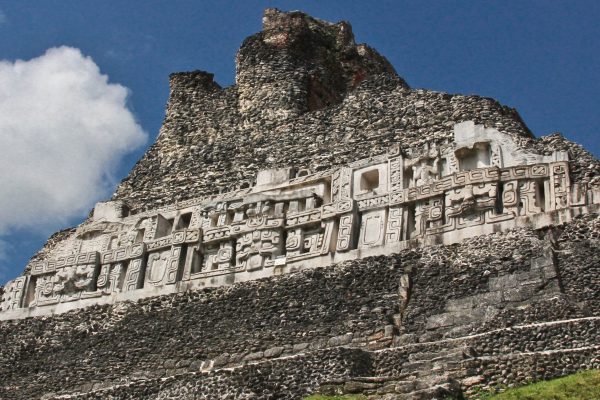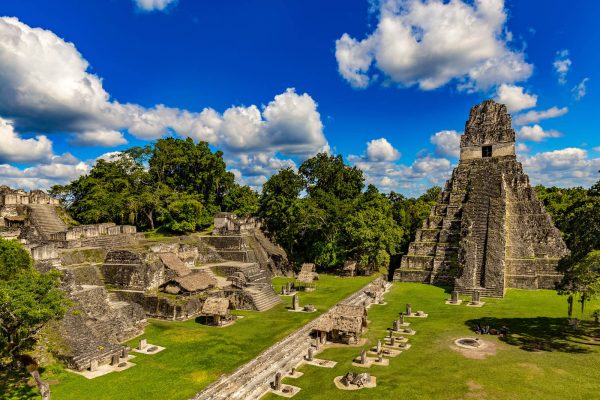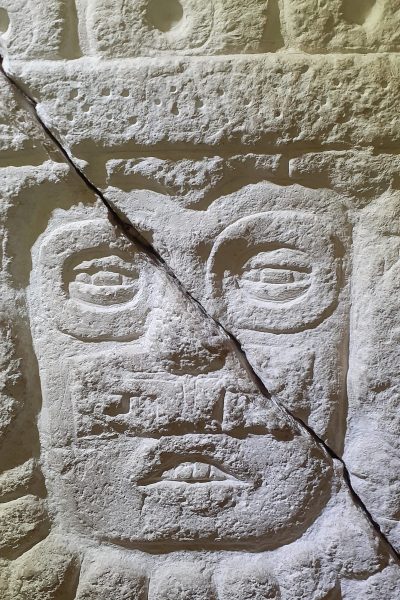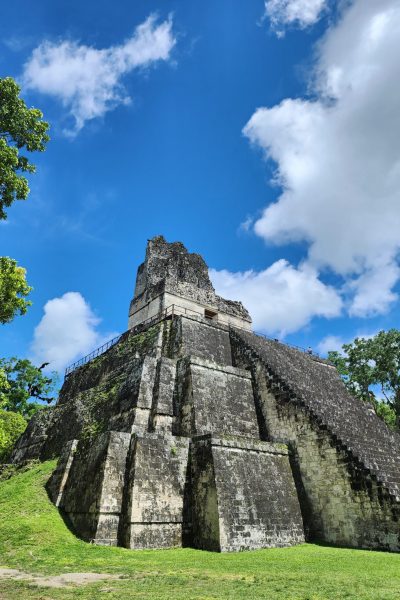Explore ancient Maya culture by visiting archaeological sites in Belize and Guatemala.
Over the course of a week, we will visit two of the most renowned Maya sites—Caracol, set among the Maya Mountains in Belize, and Tikal in Guatemala, one of the most powerful sites in the Maya region during the Classic period (ca. 300-900 CE). We will also visit and explore the sites of Xunantunich and Cahal Pech in Belize—smaller sites that show the range of ancient Maya lifeways, art, and architecture.
In addition, planned program activities will introduce students to the contemporary culture of indigenous Maya, as well as Guatemalan, Belizean, and Garifuna communities. The final day of the program includes time to relax at tropical beaches along the Belizean coast.
Students will be expected to participate in all visits to archaeological sites as part of the embedded course. Assessment of student learning will be done through reflective writing assignments that will involve students recounting both their experience and new information that they have learned during the site visits and presentations.
Program Dates: March 8–15, 2025
Pre-requisites/Eligibility: This program is open to students who are taking ANTH 221N in the spring 2025 semester, as well as students who have either completed at least one anthropology course during a prior semester or previously taken at least one course relating to the Maya (e.g., in history, art history, etc.).




This program is open to students who are taking ANTH 221N in the spring semester, as well as students who have either completed at least one Anthropology course during a prior semester or previously taken at least one course relating to the Maya (e.g., in History, Art History, etc.).
Students who commit to the program will be manually enrolled in the 1-credit embedded travel course, ANTH 297.
Students should review their academic term plans to determine any financial implications, especially if you plan to take over the maximum 19 credits in a semester. Students can anticipate actual charges using the University’s updated Tuition Calculator.
- Program Fee: Maximum of $4,830.
- In-Country Costs: Please consult with your faculty leader(s) about the amount of money to bring to cover the costs of meals and any additional spending money.
NOTE: The Program Fee will be billed to participants’ Penn State Office of the Bursar accounts in early January and payment will be due January 22nd.
The Program Fee includes: round trip airfare; hotel accommodations based on double occupancy (including breakfast each day); welcome and farewell dinners; transportation to and from the airport in Belize; transportation and fees related to program activities in Belize and Guatemala; 24-hour emergency and administrative support.
The Program Fee does NOT include: transportation to/from the U.S. airport; most meals; spending money (souvenirs, etc.); gratuities; course tuition; fees related to visa or passport
To officially commit to the program, thoroughly read and submit the Official Financial Commitment Form by Tuesday, December 3, 2024.
Students must fill out this form in order to be registered for ANTH 297.
Interested students are encouraged to contact Professor Rochette at etr109@psu.edu for additional details or with any questions.
There are several official avenues for embedded program funding within the University. The primary ways are through Liberal Arts Enrichment Funding and Penn State Global, but students can also explore funding opportunities through their academic department, the Student Engagement Network or Undergraduate Research and Fellowships Mentoring.
Get career ready!
Embedded programs help students to gain key skills that employers are most looking for in college graduates, according to the National Association of Colleges and Employers (NACE). Below are 1–2 major competencies students can start to develop by participating in this program.
Equity and Inclusion
Understand important aspects of multiculturalism and learn how to utilize your global perspectives/interactions for use in America’s multilingual society. In Belize and Guatemala, students will engage with people from different communities and backgrounds than their own and have opportunities to learn about the ways that Maya, Garifuna and other local communities maintain their cultural identities in an increasingly globalized world.
Critical Thinking
Explore and analyze information from various historical and cultural sites to help understand the contemporary culture of indigenous Maya, as well as Guatemalan, Belizean, and Garifuna communities, recognizing a diverse set of sources and seeking to gain a fuller perspective of the culture beyond the classroom.
Want to hear more? Meet with a Liberal Arts career coach in the Career Enrichment Network to discuss your experience and identify even more ways that this program can enhance your personal and professional development!





